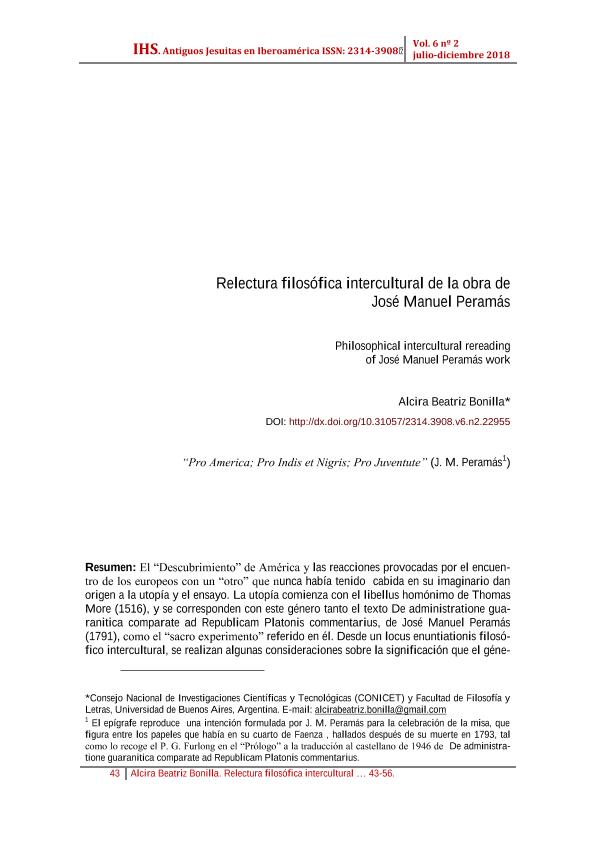Mostrar el registro sencillo del ítem
dc.contributor.author
Bonilla, Alcira Beatriz

dc.date.available
2022-11-09T12:43:42Z
dc.date.issued
2018-12
dc.identifier.citation
Bonilla, Alcira Beatriz; Relectura filosófica intercultural de la obra de José Manuel Peramás; Centro de Investigaciones y Estudios sobre Cultura y Sociedad; Antiguos Jesuitas en Iberoamérica; 6; 2; 12-2018; 43-56
dc.identifier.issn
2314-3908
dc.identifier.uri
http://hdl.handle.net/11336/177010
dc.description.abstract
El “Descubrimiento” de América y las reacciones provocadas por el encuentro de los europeos con un “otro” que nunca había tenido cabida en su imaginario dan origen a la utopía y el ensayo. La utopía comienza con el libellus homónimo de Thomas More (1516), y se corresponden con este género tanto el texto De administratione guaranitica comparate ad Republicam Platonis commentarius, de José Manuel Peramás (1791), como el “sacro experimento” referido en él. Desde un locus enuntiationis filosófico intercultural, se realizan algunas consideraciones sobre la significación que el género utópico tuvo en y para América, y una relectura analítica, breve por fuerza, de la obra mencionada, con el objeto de mostrar los límites de la interculturalidad realizada bajo condiciones asimétricas.
dc.description.abstract
The “Discovery” of America and the reactions of the Europeans due to the encounter with a never before imagined cultural “Other” gave rise to new philosophical genres: the utopia and the essay. The utopia begins with Thomas More’s homonymous libellus (1516). Utopical are also Peramás’ De administratione guaranitica comparate ad Republicam Platonis commentarius (1791), as well as the political “sacred experiment” narrated in this text -the Guaraní Missions-. On the basis of an intercultural philosophical locus enuntiationis, the autor of this article outlines some considerations on the diverse significance the utopical genre has had in America, and she provides an analytical rereading of this work, with the aim to show the limits of intercultural relationships carried out under asymmetrical conditions.
dc.format
application/pdf
dc.language.iso
spa
dc.publisher
Centro de Investigaciones y Estudios sobre Cultura y Sociedad
dc.rights
info:eu-repo/semantics/openAccess
dc.rights.uri
https://creativecommons.org/licenses/by-nc-nd/2.5/ar/
dc.subject
"DESCUBRIMIENTO"
dc.subject
UTOPÍA Y ENSAYO
dc.subject
DE ADMINISTRATIONE GUARANITICA COMPARATE AD REPUBLICAM PLATONIS COMMENTARIUS
dc.subject
INTERCULTURALIDAD EN CONDICIONES ASIMÉTRICAS DE DOMINACIÓN
dc.subject.classification
Ética

dc.subject.classification
Filosofía, Ética y Religión

dc.subject.classification
HUMANIDADES

dc.title
Relectura filosófica intercultural de la obra de José Manuel Peramás
dc.title
Philosophical intercultural rereading of José Manuel Peramás work
dc.type
info:eu-repo/semantics/article
dc.type
info:ar-repo/semantics/artículo
dc.type
info:eu-repo/semantics/publishedVersion
dc.date.updated
2022-11-08T13:55:05Z
dc.journal.volume
6
dc.journal.number
2
dc.journal.pagination
43-56
dc.journal.pais
Argentina

dc.journal.ciudad
Córdoba
dc.description.fil
Fil: Bonilla, Alcira Beatriz. Consejo Nacional de Investigaciones Científicas y Técnicas; Argentina. Universidad de Buenos Aires. Facultad de Filosofía y Letras. Instituto de Filosofía "Dr. Alejandro Korn"; Argentina
dc.journal.title
Antiguos Jesuitas en Iberoamérica
dc.relation.alternativeid
info:eu-repo/semantics/altIdentifier/doi/http://dx.doi.org/10.31057/2314.3908.v6.n2.22955
dc.relation.alternativeid
info:eu-repo/semantics/altIdentifier/url/https://revistas.unc.edu.ar/index.php/ihs/article/view/22955
Archivos asociados
